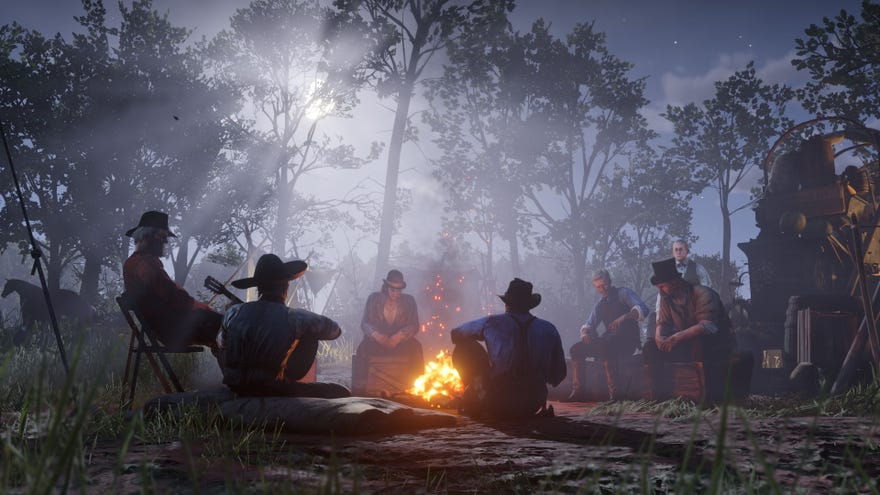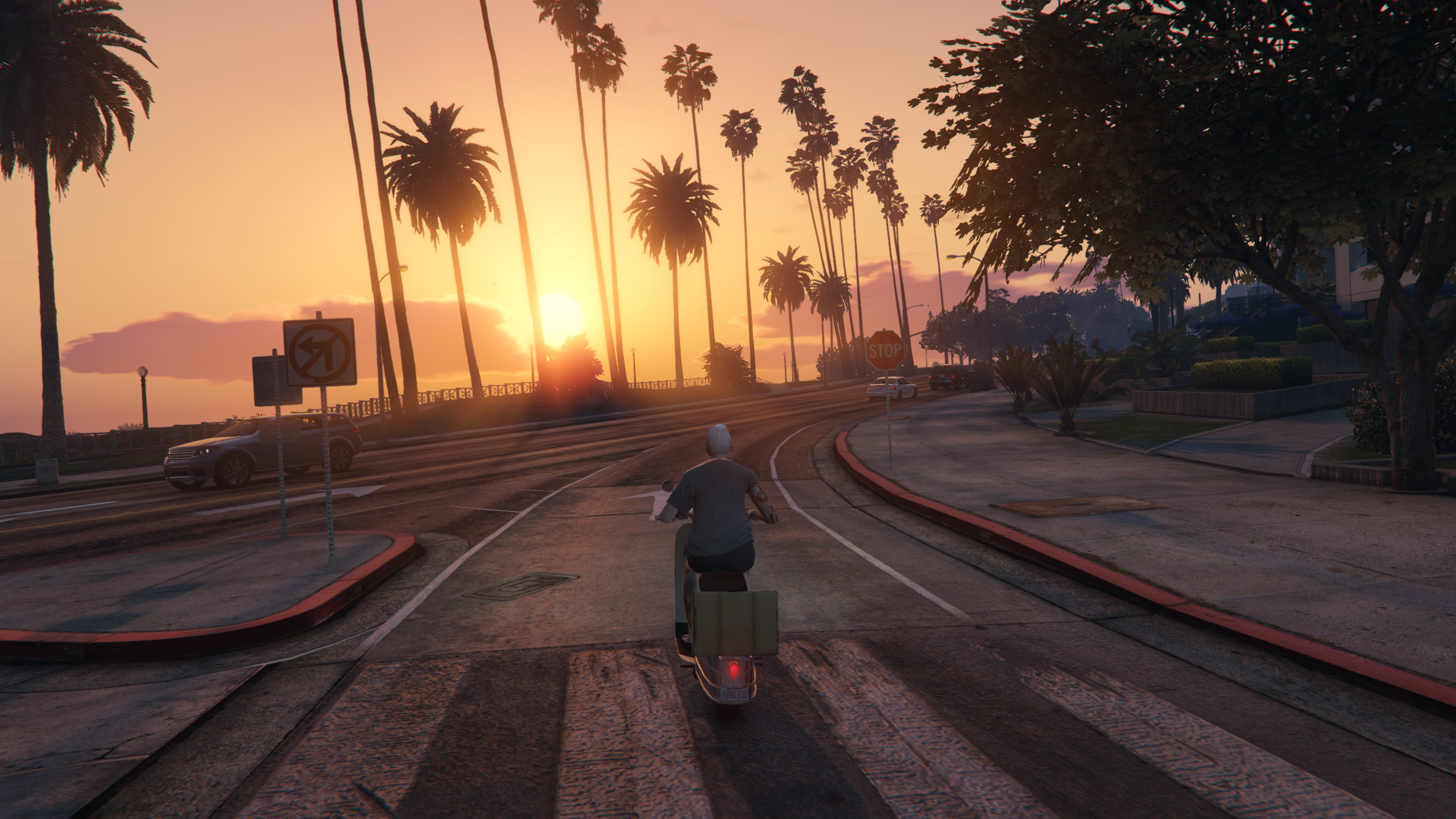Rockstar employees speak out against crunch controversy
The company gave them permission, uncharacteristically
With talk of crunch and working conditions casting a shadow over Rockstar's console launch of Red Dead Redemption 2 next week, the secretive company also behind Grand Theft Auto seem to have invited employees to speak openly about their experiences. It's an uncharacteristic and curious move, having employees try to clean up a PR mess created by co-founder Dan Houser's thoughtless boast that he and his small senior writing team have worked a few 100-hour weeks on RDR2. Rockstars who've chosen to pipe up today generally say nah they don't have it that bad, as you'd expect, but perhaps it's a promising sign that public opinion is turning against crunch enough for such a secretive company to want to present positive views.
"We have been given permission to talk openly about our experiences," engine programmer Timea Tabori wrote on her personal Twitter account. She's been followed on Twitter by folks including vehicle artist Danny Bannister, senior code content developer Phil Beveridge, model man Wesley Mackinder, lead interior previz artist Miriam Bellard, tools programmer Zoë Sams, scripter Owain Davies, animation pipeline manager Lee Sparkes, music man Keith Thorburn, and programmer Kaitlyn Burnell.
Their individual accounts differ in ways, but most broadly paint the same picture: they enjoy working at Rockstar; they do sometimes have to crunch but weeks are more like 50-60 hours than 100; earlier games had worse crunch and Rockstar have improved; they're sorry to have this mess overshadow 2edemption; and they're hurt by what they feel people are saying about them.
There are problems with relying too heavily on these accounts. While they are quite different to Amazon's weird Twitter accounts saying the known-to-be-awful employer are just swell, the Rockstar employees likely to speak up are those with good experiences. People who don't feel secure or comfortable in their jobs won't share, as you'd have to be mighty bold to publicly trash-talk your work. Plus, y'know, you couldn't speak as a current employee if conditions made you leave.
Even among these self-selecting positive accounts, 60 hours is still a long working week, and several acknowledge they crunch less than some co-workers or talk about times they've known folks to work into the morning.
Going one step further, Rockstar have given the Guardian statistics on employee's self-reported working hours. The average working week across all studios this year (up to the end of September) is coming up on 45 hours, according to those numbers, hitting 50 during the busiest week. Supposedly 20% of employees worked 60 hours or more in the busiest week, with one person putting in 67.1 hours. That's not 100 but it's still a lot.
"Do people work hard and is there overtime and extra effort put in? Yes, there is," Rockstar North co-studio head Rob Nelson told the Guardian. "Is it something we want happening regularly for long periods of time or as an accepted part of our process or as a 'badge of honour' thing? No, it is not. We are always trying to improve how we are working and balance what we are making with how we make it and we will not stop working to improve in this area."
I am again reminded of the powerful wisdom from Liz England's Twitter bot mashing video games into erotica:
But all this is secondary, really. While I am glad to hear some Rockstar employees say they enjoy it there and I'm sorry they've taken it personally, this week's conversation is in reaction to Dan Houser.
"We were working 100-hour weeks," Houser said in an interview with New York Magazine's Vulture published on Sunday, supposedly several times this year. The public response to that was broadly "WHAT? EXCUSE ME, ROCKSTAR? WHAT?" Even for an industry known to overwork people and burn them out with long weeks and months of 'crunch' overtime to meet deadlines, having a development team work 100-hour weeks would be ridiculous.
On Monday, while that there Internet you get nowadays was bubbling with people appalled by what Houser's had suggested about Rockstar's working conditions, he told Kotaku that he only meant him and the other three people on the senior writing team and only for three weeks. That's still ridiculous, but not on the same scale as previously suggested.
Houser's clarification was troubling in itself too. He conflated working hard with working long hours several times, saying that "No one, senior or junior, is ever forced to work hard." That's a wildly unhealthy attitude for the co-founder of a well-known and widely-admired studio to lay out. And presenting long hours as a choice overlooks the pressures that people can feel, including fearing their career may be harmed if they don't, wanting to prove themselves, wanting to protect pride, and feeling they're letting the team down if they go home while others continue working.
All of which meant Rockstar have become the latest talking point in the longer and wider conversation about working conditions and labour in the industry (and particularly at large studios). Three weeks after Telltale Games shut down with no notice and no severance pay for 250 employees following years of overwork and poor conditions, here's Houser making thoughtless statements.
The co-founder of one of gaming's biggest and best-known studios talking to New York Magazine about 100-hour weeks as if they're necessary and a badge of pride sends a terrible message. We must confront these attitudes (and I am glad Rob Nelson somewhat goes against his superior in his comments to the Guardian). Rockstar make good games that are good in spite of crunch, not because of it. Too much of this industry draws people in with dreams then mistreats them until they burn out and leave, or get fired, or get laid off when their studio shuts down. It's time to unionise, I hear.
Hey, that thread of games made without crunch is still growing.
Disclosure: Like half the population of Edinburgh, I have some pals at Rockstar. Those people are everywhere.



